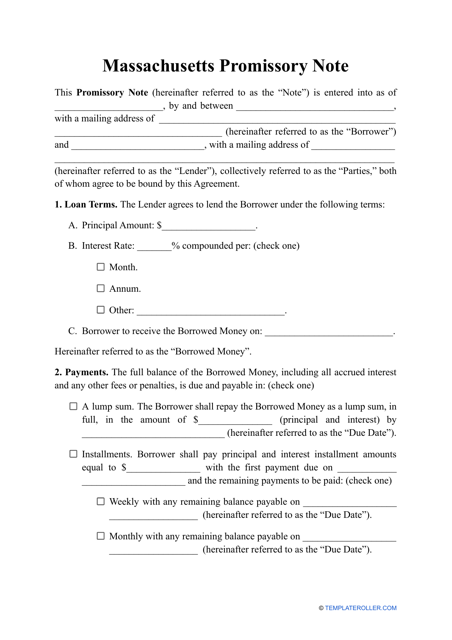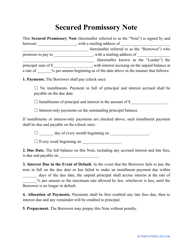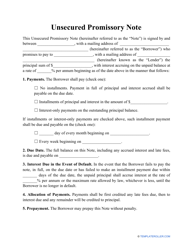Promissory Note Template - Massachusetts
A Promissory Note Template in Massachusetts is a legal document used to establish the terms of a loan agreement between two parties. It outlines the amount borrowed, interest rate, repayment terms, and consequences for default. It serves as evidence of the debt and can be used in a court of law if necessary.
The promissory note template in Massachusetts is typically filed by the borrower.
FAQ
Q: What is a promissory note?
A: A promissory note is a legal document that outlines a borrower's promise to repay a specific amount of money to a lender within a certain time frame.
Q: What is the purpose of a promissory note?
A: The purpose of a promissory note is to establish a written agreement between a borrower and a lender, detailing the terms and conditions of a loan.
Q: What information should be included in a promissory note?
A: A promissory note should include the borrower's and lender's names and addresses, the loan amount, the interest rate (if any), the repayment terms, and any additional terms or conditions.
Q: Is a promissory note legally binding?
A: Yes, a promissory note is a legally binding document that can be used as evidence in court if either party fails to fulfill their obligations.
Q: Can a promissory note be used for personal loans?
A: Yes, a promissory note can be used for personal loans between family members, friends, or individuals who are not financial institutions.
Q: Do I need a lawyer to create a promissory note?
A: While it is not required to have a lawyer create a promissory note, it can be helpful to consult with one to ensure that the document meets all legal requirements and protects your interests.
Q: Can a promissory note be modified or amended?
A: Yes, a promissory note can be modified or amended if both parties agree to the changes and the modifications are properly documented in writing.
Q: What happens if a borrower defaults on a promissory note?
A: If a borrower defaults on a promissory note, the lender may take legal action to recover the outstanding loan balance, which may include filing a lawsuit or seeking the assistance of a debt collection agency.
Q: Are there any alternatives to using a promissory note?
A: Yes, alternatives to a promissory note include a loan agreement, a demand note, or a personal guarantee, depending on the specific circumstances and terms of the loan.












